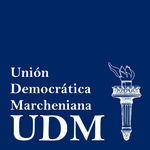User:Mu/Sandbox3: Difference between revisions
Jump to navigation
Jump to search
(→Parties with federal representation: name change edition) |
|||
| (10 intermediate revisions by the same user not shown) | |||
| Line 1: | Line 1: | ||
This article lists political parties in '''[[Marchenia]]'''. | |||
==Parties with federal representation== | |||
{| class="wikitable" style="text-align:left;" | |||
|- | |||
! !! Party logo !! Party name !! Leader !! [[Senate (Marchenia)|Senate]] seats !! [[National Assembly (Marchenia)|National Assembly]] seats !! Seats in state<br>governments !! [[Marchenia|Local government]]<br>seats!! Ideology | |||
|- | |||
| rowspan="1.5" style="background: #002664;" | | |||
| [[File:UDM.png|150px]] | |||
| [[Marchenian Democratic Union]]<br>''Unión Democrática Marcheniana'' | |||
| [[File:Enrique_Peña_Nieto_(16411998596)_(cropped).jpg|100px]]<br>[[Emiliano Fernandino]] | |||
| {{Template:Infobox political party/seats|94|310|#002664}} | |||
| {{Template:Infobox political party/seats|0|700|#002664}} | |||
| {{Template:Infobox political party/seats|0|900|#002664}} | |||
{{ | | {{Template:Infobox political party/seats|0|35750|#002664}} | ||
| | |||
*{{wp|Modern liberalism}} | |||
*{{wp|Social liberalism}} | |||
*{{wp|Centrism}} | |||
|- | |||
| colspan="8" | The Marchenian Democratic Union was formed in 1990 following the [[Marigold Revolution (Marchenia)|Marigold Revolution]], the end of the [[Government of National Salvation and Rejuvenation|civic-military dictatorship]], and the collapse of the [[Party of Republican Institutions#Liberal-wing|Party of Republican Institutions]]. The party sources its political heritage largely from the former [[Democratic Movement (Marchenia)|Democratic Movement]], the [[National Citizenry (Marchenia)|National Citizenry]], and [[Liberty Front (Marchenia)|Liberty Front]] that briefly governed the country between 1930 and 1938, prior to the [[1938 Marchenian coup d'etat|end of democracy]] in 1938. Initially formed as a {{wp|center-left politics|center-left}} party, the party has since adopted a number of centrist and center-right positions following its 2007 split with [[The Left (Marchenia)|The Left]]. At current the party is described as being firmly centrist, with many political theorists placing it into the category of center-leaning-right. It is the largest party in [[Parliament (Marchenia)|Parliament]] though its hold on the government has slipped since [[2010 Marchenian parliamentary elections|2010]], owing largely to corruption scandals and voter dissatisfaction. | |||
|- | |||
| rowspan="2" style="background: #000000;" | | |||
| [[File:NPR.png|150px]] | |||
| [[New Republican Pole (Marchenia)|New Republican Pole]]<br>''Nuevo Polo Republicano'' | |||
| [[File:Andrew_Cuomo_2014_(cropped).jpg|100px]]<br>[[Juan David Obregon]] | |||
| {{Template:Infobox political party/seats|80|310|#000000}} | |||
| {{Template:Infobox political party/seats|0|700|#000000}} | |||
| {{Template:Infobox political party/seats|0|910|#000000}} | |||
| {{Template:Infobox political party/seats|0|35750|#000000}} | |||
| | |||
*{{wp|Right-wing populism}} | |||
*{{wp|National conservatism}} | |||
*{{wp|Paternalistic conservatism}} | |||
*{{wp|Integralism|Neo-Integralism}} | |||
*{{wp|Syncretic politics|Syncretism}} | |||
|- | |||
| colspan="8" | The New Republican Pole was founded in 2010 by {{wp|member of parliament|MPs}} of the [[People's Convergence (Marchenia)|People's Convergence]] and [[Agricultural Party (Marchenia(|Agricultural Party]] dissatisfied with the direction of their respective parties. The NPR sits within the {{wp|far-right politics|far-right}} of the political spectrum and has adopted many {{wp|right-wing populism|populist}}, {{wp|paternalistic conservatism|paternalistic}}, and {{wp|Integralism|Neo-Integralist}} political stances. Its sudden outgrowth has placed some pressure on parties such as the People's Convergence, the Agricultural Party, and even the Marchenian Democratic Union, to reform their platforms. In [[2015 Marchenian parliamentary elections|the 2015 elections]] the party supplanted the CdP to become the second-largest party in [[Parliament (Marchenia)|Parliament]], leaving many to opine the possibility of a NPR-CdP-PA {{wp|coalition government}}. | |||
|- | |||
| rowspan="2" style="background: #FFCC00;" | | |||
| [[File:CdP.png|150px]] | |||
| [[People's Convergence (Marchenia)|People's Convergence]]<br>''Convergencia del Pueblo'' | |||
| [[File:Marco_Rubio_(23659965265).jpg|100px]]<br>[[Ernesto Correa]] | |||
| {{Template:Infobox political party/seats|42|310|#FFCC00}} | |||
| {{Template:Infobox political party/seats|0|700|#FFCC00}} | |||
| {{Template:Infobox political party/seats|0|900|#FFCC00}} | |||
| {{Template:Infobox political party/seats|0|35750|#FFCC00}} | |||
| | |||
*{{wp|Social conservatism}} | |||
*{{wp|Economic liberalism}} | |||
|- | |||
| colspan="8" | The People's Convergence Party was formed in 1990 following the [[Marigold Revolution (Marchenia)|Marigold Revolution]], having its roots in the conservative wing of the [[Party of Republican Institutions#Conservative-wing|Party of Republican Institutions]] and the pre-1938 [[Conservative Party (Marchenia)|Conservative Party]]. It sources much of its current day membership from {{wp|Christian democracy|Sotirian democrats}} and {{wp|moderate conservatism|moderate conservatives}}. It has been described as a {{wp|center-right politics|center-right}} to {{wp|right-wing politics|right-wing}} political party, though under the leadership of [[Ernesto Correa]] the party has adopted a number of harder right-wing and some {{wp|far-right politics|far-right}} positions in an attempt to circumvent the [[New Republican Pole (Marchenia)|New Republican Pole]]. Previously the second-largest party in [[Parliament (Marchenia)|Parliament]], the CdP was supplanted by the NPR following the [[2015 Marchenian parliamentary election|2015 parliamentary election]]. | |||
|- | |||
|- | |||
| rowspan="2" style="background: #CE1126;" | | |||
| [[File:IZQ.png|150px]] | |||
| [[The Left (Marchenia)|The Left]]<br>''La Izquierda'' | |||
| [[File:Ortega_Lula_-_ABr_28.07.20102225_(cropped).JPG|100px]]<br>[[Luis Zoido]] | |||
| {{Template:Infobox political party/seats|30|310|#CE1126}} | |||
| {{Template:Infobox political party/seats|0|700|#CE1126}} | |||
| {{Template:Infobox political party/seats|0|910|#CE1126}} | |||
| {{Template:Infobox political party/seats|0|35750|#CE1126}} | |||
| | |||
*{{wp|Social democracy}} | |||
*{{wp|Democratic socialism}} | |||
*{{wp|Left-wing nationalism}} | |||
*{{wp|Socialism of the 21st century}} | |||
|- | |||
| colspan="8" | The Left is a {{wp|left-wing politics|left-wing}} political party, initially part of the Marchenian Section of the Worker's International, that reemerged following the [[Marigold Revolution (Marchenia)|Marigold Revolution]] and a subsequent split with the SMIT over the direction of the party. Since then the party has charted its own path, becoming the recognized party of the left in Marchenia. It is currently the fourth largest party in [[Parliament (Marchenia)|Parliament]]. | |||
|- | |||
| rowspan="2" style="background: #964B00;" | | |||
| [[File:PDMin.png|150px]] | |||
| [[Party of Minority Rights (Marchenia)|Party of Minority Rights]]<br>''Partido de los Derechos de las Minorías'' | |||
| [[File:Raleiigh, NC Town Hall - 49644459688 (1).jpg|100px]]<br>[[Juana Espiga]] | |||
| {{Template:Infobox political party/seats|16|310|#964B00}} | |||
| {{Template:Infobox political party/seats|0|700|#964B00}} | |||
| {{Template:Infobox political party/seats|0|900|#964B00}} | |||
| {{Template:Infobox political party/seats|0|35750|#964B00}} | |||
| | |||
*{{wp|African-American leftism|Bahio-Marchenian leftism}} | |||
*{{wp|Anti-imperialism}} | |||
*{{wp|Anti-racism}} | |||
|- | |||
| colspan="8" | The Party of Minority rights was formed in 1990 following the [[Marigold Revolution (Marchenia)|Marigold Revolution]] and is primarily geared towards the interests of [[Bahia|Bahio-Marchenians]], though it does frequently form alliances with [[Indigenous Unity (Marchenia)|Indigenous Unity]], as well as fight for the interests of [[Coius|Coio-Marchenians]] within the country. It frequently forms electoral alliances with the [[Marchenian Democratic Union (Marchenia)|Marchenian Democratic Union]] via a {{wp|confidence and supply}} agreement. | |||
|- | |||
| rowspan="2" style="background: #CC9900;" | | |||
| [[File:PAg.png|150px]] | |||
| [[Agricultural Party (Marchenia)|Agricultural Party]]<br>''Partido Agrícola'' | |||
| [[File:Luis_Gutiérrez_official_photo.jpg|100px]]<br>[[Simon Indiano|Simón Indiano]] | |||
| {{Template:Infobox political party/seats|16|310|#CC9900}} | |||
| {{Template:Infobox political party/seats|0|700|#CC9900}} | |||
| {{Template:Infobox political party/seats|0|900|#CC9900}} | |||
| {{Template:Infobox political party/seats|0|35750|#CC9900}} | |||
| | |||
*{{wp|Agrarianism}} | |||
*{{wp|Christiam democracy|Sotirian democracy}} | |||
*{{wp|Conservatism}} | |||
|- | |||
| colspan="8" | The Agricultural Party is the oldest political entity still active within the country, being formed in 1865, and largely escaped the widespread {{wp|ban|banning of many political parties}} during the [[Government of National Salvation and Rejuvenation|civic-military dictatorship]]. It has primarily held power in local and state elections, forming a political alliance with the [[People's Convergence (Marchenia)|People's Convergence]] following the latter's founding in 1990. Recent trends under the leadership of [[Simon Indiano|Simón Indiano]] have seen the party adopt some {{wp|right-wing politics|right-wing}} policy positions. | |||
|- | |||
| rowspan="2" style="background: #7F0000;" | | |||
| [[File:SMIT.png |150px]] | |||
| [[Marchenian Section of the Worker's International (Marchenia)|Marchenian Section of the Worker's International]]<br>''Sección Marcheniana de la Internacional de Trabajadores'' | |||
| [[File:Nicolás Maduro (2019-10-25) 02.jpg|100px]]<br>[[Mateo Cambeiro]] | |||
| {{Template:Infobox political party/seats|12|310|#7F0000}} | |||
| {{Template:Infobox political party/seats|0|700|#7F0000}} | |||
| {{Template:Infobox political party/seats|0|900|#7F0000}} | |||
| {{Template:Infobox political party/seats|0|35750|#7F0000}} | |||
| | |||
*{{wp|Evolutionary socialism}} | |||
*{{wp|Soviet democracy|Council democracy}} | |||
*{{wp|Libertarian socialism}} | |||
|- | |||
| colspan="8" | The Marchenian Section of the Worker's International is a {{wp|far-left politics|far-left}} political party, initially established in 1910 as a merger of the [[Socialist Party of Marchenia]], the [[Worker's and Laborer's Party (Marchenia)|Worker's and Laborer's Party]], and the various {{wp|anarchism|anarchist}} groups, that reemerged following the [[Marigold Revolution (Marchenia)|Marigold Revolution]]. The party had previously operated between 1910 and 1938 before being banned following the [[1938 Marchenian coup d'etat|1938 coup d'etat]]. It was a significant part of the [[Marchenian resistance movement]] that emerged during ''La Dictablanda'' against the [[Government of National Salvation and Rejuvenation|civic-military dictatorship]], though it was later overtaken by more liberal entities. Largely absent from national politics, the party nevertheless serves as an alternative to [[The Left (Marchenia)|The Left]] and is popular with student movements, as well as those on the more radical side of the leftist political spectrum. | |||
|- | |||
| rowspan="2" style="background: #267F00;" | | |||
| [[File:VERDE.png|150px]] | |||
| [[Verde (Marchenia)|Verde]]<br>''Verde'' | |||
| [[File:Conversation_About_America's_Future_with_Anand_Giridharadas_at_SXSW_(48466867542)_(cropped2).jpg|100px]]<br>[[Natalia Quesada]] | |||
| {{Template:Infobox political party/seats|11|310|#267F00}} | |||
| {{Template:Infobox political party/seats|0|700|#267F00}} | |||
| {{Template:Infobox political party/seats|0|900|#267F00}} | |||
| {{Template:Infobox political party/seats|0|35750|#267F00}} | |||
| | |||
*{{wp|Green politics}} | |||
*{{wp|Modern liberalism}} | |||
*{{wp|Communalism}} | |||
*{{wp|Eco-socialism}} | |||
|- | |||
| colspan="8" | Verde was founded in 1997 by {{wp|List of climate scientists|climate scientists}}, {{wp|Environmental movement|green activists}}, and {{wp|progressivisim|progressives}} who saw the lack of political parties focused on {{wp|green politics}} following the national resumption of democracy. Anti-nuclear, anti-fossil fuels, pro-green energy, and {{wp|Eco-socialism|eco-socialist}}, Verde has pushed for policies geared towards securing {{wp|carbon neutrality}} within the coming decades. | |||
|- | |||
| rowspan="2" style="background: #C87137;" | | |||
| [[File:UnIn.png|150px]] | |||
| [[Indigenous Unity (Marchenia)|Indigenous Unity]]<br>''Unidad Indígena'' | |||
| [[File:Ben Shelly.jpg|100px]]<br>[[Esteban Tasis]] | |||
| {{Template:Infobox political party/seats|9|310|#C87137}} | |||
| {{Template:Infobox political party/seats|0|700|#C87137}} | |||
| {{Template:Infobox political party/seats|0|900|#C87137}} | |||
| {{Template:Infobox political party/seats|0|35750|#C87137}} | |||
| | |||
*{{wp|Political parties of minorities|Indigenous interests}} | |||
*{{wp|Environmentalism}} | |||
*{{wp|Conservation movement|Conservationism}} | |||
|- | |||
| colspan="8" | Indigenous Unity was formed in 1990 following the [[Marigold Revolution (Marchenia)|Marigold Revolution]], being primarily aimed at preserving indigenous communities and the indigenous way of life. It lacks a large following nationwide, mainly focusing on local and state elections, though it does lend support to the [[Marchenian Democratic Union]] via a {{wp|confidence and supply}} agreement. | |||
|- | |||
|} | |||
Latest revision as of 16:12, 5 February 2021
This article lists political parties in Marchenia.
Parties with federal representation
| Party logo | Party name | Leader | Senate seats | National Assembly seats | Seats in state governments |
Local government seats |
Ideology | |
|---|---|---|---|---|---|---|---|---|

|
Marchenian Democratic Union Unión Democrática Marcheniana |
 Emiliano Fernandino |
94 / 310
|
0 / 700
|
0 / 900
|
0 / 35,750
|
||
| The Marchenian Democratic Union was formed in 1990 following the Marigold Revolution, the end of the civic-military dictatorship, and the collapse of the Party of Republican Institutions. The party sources its political heritage largely from the former Democratic Movement, the National Citizenry, and Liberty Front that briefly governed the country between 1930 and 1938, prior to the end of democracy in 1938. Initially formed as a center-left party, the party has since adopted a number of centrist and center-right positions following its 2007 split with The Left. At current the party is described as being firmly centrist, with many political theorists placing it into the category of center-leaning-right. It is the largest party in Parliament though its hold on the government has slipped since 2010, owing largely to corruption scandals and voter dissatisfaction. | ||||||||

|
New Republican Pole Nuevo Polo Republicano |
 Juan David Obregon |
80 / 310
|
0 / 700
|
0 / 910
|
0 / 35,750
|
||
| The New Republican Pole was founded in 2010 by MPs of the People's Convergence and Agricultural Party dissatisfied with the direction of their respective parties. The NPR sits within the far-right of the political spectrum and has adopted many populist, paternalistic, and Neo-Integralist political stances. Its sudden outgrowth has placed some pressure on parties such as the People's Convergence, the Agricultural Party, and even the Marchenian Democratic Union, to reform their platforms. In the 2015 elections the party supplanted the CdP to become the second-largest party in Parliament, leaving many to opine the possibility of a NPR-CdP-PA coalition government. | ||||||||

|
People's Convergence Convergencia del Pueblo |
 Ernesto Correa |
42 / 310
|
0 / 700
|
0 / 900
|
0 / 35,750
|
||
| The People's Convergence Party was formed in 1990 following the Marigold Revolution, having its roots in the conservative wing of the Party of Republican Institutions and the pre-1938 Conservative Party. It sources much of its current day membership from Sotirian democrats and moderate conservatives. It has been described as a center-right to right-wing political party, though under the leadership of Ernesto Correa the party has adopted a number of harder right-wing and some far-right positions in an attempt to circumvent the New Republican Pole. Previously the second-largest party in Parliament, the CdP was supplanted by the NPR following the 2015 parliamentary election. | ||||||||

|
The Left La Izquierda |
 Luis Zoido |
30 / 310
|
0 / 700
|
0 / 910
|
0 / 35,750
|
||
| The Left is a left-wing political party, initially part of the Marchenian Section of the Worker's International, that reemerged following the Marigold Revolution and a subsequent split with the SMIT over the direction of the party. Since then the party has charted its own path, becoming the recognized party of the left in Marchenia. It is currently the fourth largest party in Parliament. | ||||||||

|
Party of Minority Rights Partido de los Derechos de las Minorías |
 Juana Espiga |
16 / 310
|
0 / 700
|
0 / 900
|
0 / 35,750
|
||
| The Party of Minority rights was formed in 1990 following the Marigold Revolution and is primarily geared towards the interests of Bahio-Marchenians, though it does frequently form alliances with Indigenous Unity, as well as fight for the interests of Coio-Marchenians within the country. It frequently forms electoral alliances with the Marchenian Democratic Union via a confidence and supply agreement. | ||||||||
| Agricultural Party Partido Agrícola |
 Simón Indiano |
16 / 310
|
0 / 700
|
0 / 900
|
0 / 35,750
|
|||
| The Agricultural Party is the oldest political entity still active within the country, being formed in 1865, and largely escaped the widespread banning of many political parties during the civic-military dictatorship. It has primarily held power in local and state elections, forming a political alliance with the People's Convergence following the latter's founding in 1990. Recent trends under the leadership of Simón Indiano have seen the party adopt some right-wing policy positions. | ||||||||

|
Marchenian Section of the Worker's International Sección Marcheniana de la Internacional de Trabajadores |
 Mateo Cambeiro |
12 / 310
|
0 / 700
|
0 / 900
|
0 / 35,750
|
||
| The Marchenian Section of the Worker's International is a far-left political party, initially established in 1910 as a merger of the Socialist Party of Marchenia, the Worker's and Laborer's Party, and the various anarchist groups, that reemerged following the Marigold Revolution. The party had previously operated between 1910 and 1938 before being banned following the 1938 coup d'etat. It was a significant part of the Marchenian resistance movement that emerged during La Dictablanda against the civic-military dictatorship, though it was later overtaken by more liberal entities. Largely absent from national politics, the party nevertheless serves as an alternative to The Left and is popular with student movements, as well as those on the more radical side of the leftist political spectrum. | ||||||||

|
Verde Verde |
 Natalia Quesada |
11 / 310
|
0 / 700
|
0 / 900
|
0 / 35,750
|
||
| Verde was founded in 1997 by climate scientists, green activists, and progressives who saw the lack of political parties focused on green politics following the national resumption of democracy. Anti-nuclear, anti-fossil fuels, pro-green energy, and eco-socialist, Verde has pushed for policies geared towards securing carbon neutrality within the coming decades. | ||||||||
| Indigenous Unity Unidad Indígena |
 Esteban Tasis |
9 / 310
|
0 / 700
|
0 / 900
|
0 / 35,750
|
|||
| Indigenous Unity was formed in 1990 following the Marigold Revolution, being primarily aimed at preserving indigenous communities and the indigenous way of life. It lacks a large following nationwide, mainly focusing on local and state elections, though it does lend support to the Marchenian Democratic Union via a confidence and supply agreement. | ||||||||